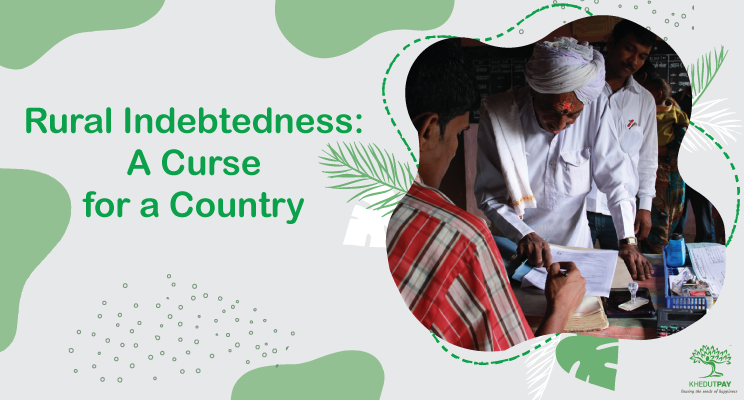

Every country around the globe is living under a certain amount of debt. Even the developed countries have debt. In 2019, 53.5% of Indian households were living in debt. The figures are declining, but rural figures are declining at lower rates. Rural debts indicate a country’s weak financial infrastructure. Our system is not able to reach the needy rural peoples. There are different reasons which cause rural indebtedness.
Poverty is a significant issue for both rural development and rural indebtedness. The per capita income in rural areas is low and uncertain, making it harder for small farmers to meet basic living needs. They take debts to meet those basic needs.
In rural India, most rural debts are inherited, and these debts are increasing over time. Legally, the inheritors only have to pay the debt of the property inherited by him/her. But still, most rural people continue to pay the debts of forbears. This is because of a lack of awareness and illiteracy. Rural people are not aware of the laws.
Very few people are aware of the laws, but they continue to pay debts because the values and traditions bound them, and they believe that it is their sacred duty to repay those debts.
These increasing debts are passed on to new generations, making it difficult to repay those debts. The royal commission has stated that “Indian farmers are born in debt, lives in debt, and dies in debt.”
Tradition, values, and customs bound rural people. They consider it sacred. Examples are marriage, birth ceremony, death ceremony, etc. To perform these ceremonies, they need a high amount of money. To perform these ceremonies and meet money requirements, rural people take loans. What happens now is they do not have sufficient income to repay those loans. Thus, the loans remain unpaid, and the amount increases with time, leaving them, and coming generations in debt.
Generally, the farmers in India are involved in property and land issues, which makes them go to the court of law. Winning the case is important to them because it is related to family honour and prestige. Such litigations cost them a humongous amount of time and money. To meet the money requirements, they take loans, and in some cases, if they win, they repay the loans. But in some cases, even after winning the case, they are not to repay loans, and even worse, if they lose, they lose money and time. This leaves them in debt.
Indian farmers highly depend on rain for the supply of water. Rainfall in India is uncertain. Sometimes there is no rain, and sometimes there is an excess of rain, both ruins the crop. So the money invested in something productive goes in vain. It becomes a burden and leads to indebtedness.
For small farmers, Land revenues levied by the states and rents have become an excessive burden. Small farmers do not have sufficient income to land revenues and rents; they had to take loans to pay revenues and rents. Even in conditions like floods and drought, when they do not have any income source, they have to pay dues, eventually making them take loans and running into debts.
These were major factors that cause indebtedness. Rural people face indebtedness for many years now, and we should work towards reducing the debt and take measures to prevent it in the future.
Reducing indebtedness is as important as preventing it from rising again in the future. Thus, both these measures should be taken simultaneously to make rural areas debt-free.
We at KhedutPay ensure that the needs of farmers are fulfilled hasslefree. We have created a technology-based e-commerce platform where farmers can reach and sell rural products to the masses. We also offer necessary supplies for farming to farmers at affordable prices. For more information, visit us at www.khedutpay.com or give a missed call at (+91)9081813881.
